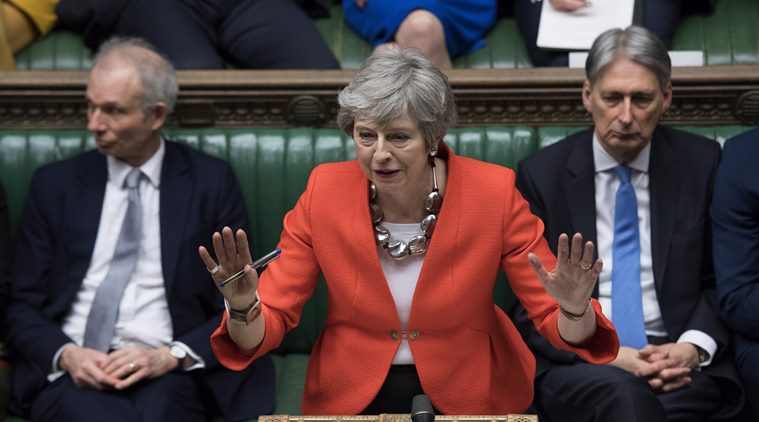
By Ellen Barry
If you watched Theresa May closely in Parliament on Tuesday, hours before a critical vote on her Brexit plan, there were signs she knew her deal was close to extinction.
The first hint came when her husband, Philip, quietly slid into a seat in the VIP gallery. Philip rarely shows up for her events unless she is in trouble, and a ripple of apprehension went through the press gallery. This was serious.
And then she started to talk. Whether because of sleeplessness or the grinding stress of last-ditch negotiations, when she took her place at the dispatch box what came out was a dry, croaking rasp. It was a repeat of a nightmarish appearance in 2017, when she whispered her way through a major speech, desperately gulping water and sucking on lozenges.
If May thought her party members would close ranks around her in her hour of need, she was wrong. As she spoke Tuesday before the vote, the benches behind her were half-empty, many of her own party members having stayed away.
“This really is tragic,” remarked Paul Waugh, who was covering the hearing for HuffPost. “May voiceless and lacking friends on her own side.”
It is hardly a new thing for the country to watch May struggle. She has spent 2 1/2 years as prime minister surviving one political crisis after another, largely through the lack of any palatable candidate to replace her. Journalists have long since exhausted all the available metaphors: Groundhog Day, high noon, crunch time, dead woman walking.
But May’s survival has been predicated, in large part, on a gamble. She has bet that, by waiting to the eve of Britain’s withdrawal from the European Union, she could alarm her squabbling lawmakers into compliance, if only to avoid the bleak alternatives. This week, it seemed she had lost that bet.
The knockout blow came Tuesday morning, from an unexpected direction: her attorney general, Geoffrey Cox.
Cox, who speaks in the clavicle-juddering bass of an Old Testament prophet, has achieved a degree of celebrity as May’s surrogate and protector. But on Tuesday morning, when Cox had a chance to throw the prime minister a life preserver, he declined.
May had hoped that the day would go her way. Her 11-hour negotiations in Strasbourg had provided a glimmer of hope in the form of legal reassurances, which she hoped would persuade hard-line Brexiteers that Britain would not get stuck in the so-called Irish backstop.
Cox was asked for his legal opinion — were the reassurances persuasive? — and all morning, journalists swapped hearsay about what Cox would do. One reported, via Twitter, that he had come under pressure to “go away and find a way to say YES.” To this, Cox offered a concise, and unprintable, reply.
When Cox’s legal opinion was published, it was damning, noting at one point that, despite May’s last-ditch efforts, “the legal risk remains unchanged.”
“What he wrote was probably fatal,” said Anand Menon, a professor of European politics and foreign affairs at King’s College London.
Still reeling from this blow, May took the stage, looking pale and weary. Her critics made sympathetic remarks about her sore throat, then carried on criticizing her. Her Cabinet members were grim-faced. Her husband, his chin propped on his hand, watched her from the gallery. Waugh, the politics editor of HuffPost UK, said he had not seen her so dejected since 2017, when her decision to call a snap election proved disastrous.
“Sometimes when her back is against the wall, she puts in a feisty performance, but that wasn’t there today,” said Ayesha Hazarika, a former adviser to Labour politicians. “It looked like it was hard work today. She didn’t have anyone with her. She didn’t even have Geoffrey Cox with her.”
Her withdrawal agreement was voted down, in the end, in a vote of 391-242, making it one of the worst government defeats in history. Outside, Tory rebels spoke with increasing comfort, about replacing her.
“Why did she not announce her resignation tonight?” a reporter asked James Cleverly, the deputy chairman of the Conservative Party. “When has there been a time in British politics when a prime minister has lost on such a crucial vote twice and not resigned?”
Meanwhile, Menon said, Britain is propelled further along “this insane game of chicken.”
“Watching them strut around Parliament today, there are clearly a lot of people thinking about their places in history,” he said. “There are very few people thinking about what happens next.”
When she returned to acknowledge the defeat, May was still rasping.
But now she seemed angry. The deal that she had poured herself into for 2 1/2 years, painstakingly reaching compromise with Brussels on one provision after another, had unraveled in her hands.
“I profoundly regret the decision this house has taken tonight,” she said, and her voice had an edge to it. She declared that a vote on Wednesday, potentially blocking a no-deal exit, would be a free vote, meaning the leadership would no longer instruct members on how to vote. It was an acknowledgment she had lost control over the process, not that she expects to leave the stage. Not yet.
“Brexit has killed her and saved her at the same time,” Hazarika said. “It’s her job. She knows as soon as Brexit’s done, she’s done.” She added that, as far as she could see, that moment hadn’t arrived.
“I think she’ll cling on as long as possible,” she said. “I think she and her advisers will be in a room tonight, plotting how to bring everything back.”